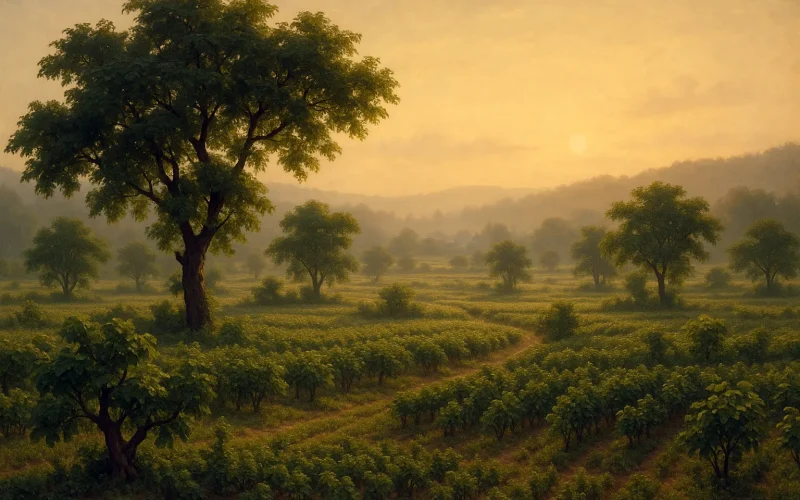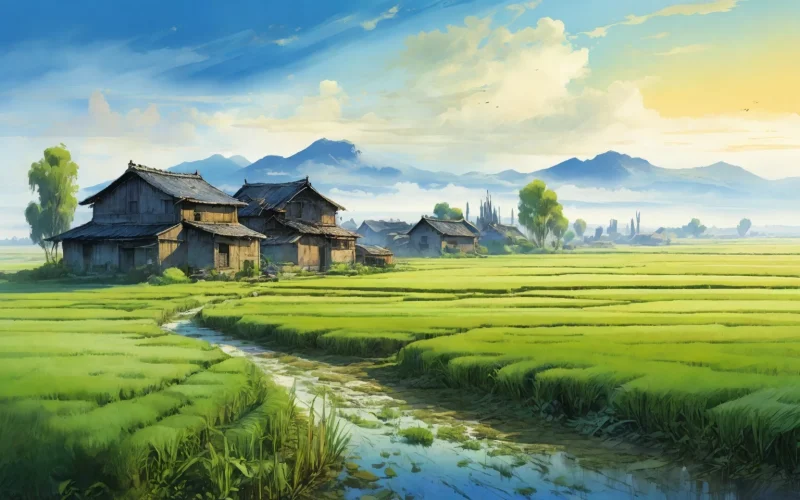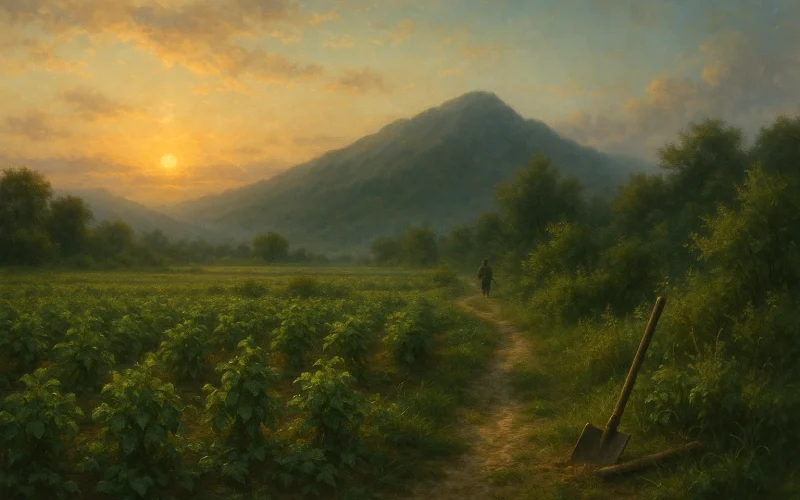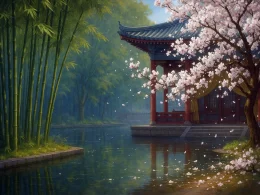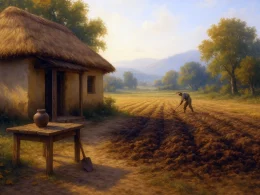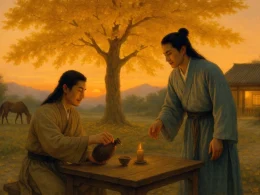In countryside few care about the State,
Nor Wheels nor hooves are heard in the deep gloom.
By broad daylight I close my wicket gate;
No worldly dust invades my vacant room.
Sometimes I go along the winding way
And meet with peasants through the bushy field.
Then we have nothing untoward to say
But talk about our corn’s growth and its yield.
Our corn grows day by day under our feet;
My field becomes wider beyond wild grass.
But I fear the onset of frost and sleet
Would do harm to my corn and grain, alas!
Original Poem
「归园田居 · 其二」
陶渊明
野外罕人事,穷巷寡轮鞅。
白日掩荆扉,虚室绝尘想。
时复墟曲中,披草共来往。
相见无杂言,但道桑麻长。
桑麻日已长,我土日已广。
常恐霜霰至,零落同草莽。
Interpretation
Composed around 405 CE, this poem is the second in Tao Yuanming's five-part "Returning to Dwell in Gardens and Fields" series. While the first poem focuses on the initial liberation of reclusion, this work shifts to depict daily rural life. Through tranquil natural scenes and simple human interactions, the poet expresses joy in pastoral existence while revealing underlying anxiety about crops potentially ruined by natural disasters—capturing a nuanced "joy-tempered-by-concern" mentality.
First Couplet: "野外罕人事,穷巷寡轮鞅。"
Yěwài hǎn rénshì, qióng xiàng guǎ lún yāng.
Countryside spares worldly affairs; deep lanes seldom bear carriage marks.
"Spared affairs" and "seldom carriage marks" establish rural seclusion, framing the recluse's peaceful sanctuary.
Second Couplet: "白日掩荆扉,虚室绝尘想。"
Báirì yǎn jīng fēi, xū shì jué chén xiǎng.
Daylight finds my bramble gate closed; empty rooms purge dusty thoughts.
"Empty rooms purge dusty thoughts" epitomizes spiritual freedom achieved through physical withdrawal.
Third Couplet: "时复墟曲中,披草共来往。"
Shí fù xū qū zhōng, pī cǎo gòng láiwǎng.
Sometimes through hamlet bends I go, parting grasses to visit neighbors.
The act of "parting grasses" embodies organic sociality—neither isolation nor obligation.
Fourth Couplet: "相见无杂言,但道桑麻长。"
Xiāngjiàn wú zá yán, dàn dào sāng má zhǎng.
No trivial talk when we meet—only how mulberries and hemp grow.
Conversations reduced to crop growth reflect primal human-nature symbiosis.
Fifth Couplet: "桑麻日已长,我土日已广。"
Sāng má rì yǐ zhǎng, wǒ tǔ rì yǐ guǎng.
Mulberries and hemp rise daily; my tilled earth spreads farther.
Agricultural progress mirrors the poet's growing rootedness in pastoral labor.
Sixth Couplet: "常恐霜霰至,零落同草莽。"
Cháng kǒng shuāng sǎn zhì, língluò tóng cǎo mǎng.
Ever fearing frost may strike, reducing all to withered weeds.
The sudden dread of nature's caprice tempers agrarian contentment with existential vulnerability.
Holistic Appreciation
The poem navigates between rural serenity and earthly concerns. Its first half celebrates detachment from worldly noise ("purged dusty thoughts"), while the second half acknowledges farming's precariousness ("fearing frost"). This duality reveals Tao's authentic engagement with reclusion—not as escapism but as conscious coexistence with nature's gifts and threats. The unadorned language, flowing like field breezes, carries profound reverence for life's fragile abundance.
Artistic Merits
Tao masters the art of 白描 (plain depiction)—recording mundane moments ("closed bramble gate," "parting grasses") with photographic immediacy that paradoxically reveals metaphysical depth. His technique of 动静结合 (dynamic-stasis fusion) shines in contrasts like shuttered solitude versus grassy footpaths. The poem's power lies in its 真 (authenticity), where even anxiety about frost feels organic rather than contrived.
Insights
This work redefines tranquility: not as passive absence of worry but as active harmony with life's rhythms—both sweet and bitter. Tao's "joy-tempered-by-concern" model speaks acutely to our climate-anxious era, suggesting true peace comes not from controlling nature but from aligning with its cadences. For modern readers drowning in digital chatter, his "empty rooms purging dusty thoughts" offer a radical prescription: sometimes the deepest connections begin with disconnection.
Poem translator
Xu Yuanchong (许渊冲)
About the poet

Tao Yuanming(陶渊明), 365 – 427 CE, was a poet, literary figure, fu writer, and essayist active during the late Eastern Jin and early Liu Song dynasties. Born in Chaisang (near present-day Jiujiang, Jiangxi Province), he pioneered a new genre of pastoral-themed literature, expressing profound philosophical insights through simple language. His poetic style became an enduring aesthetic standard in classical Chinese poetry.






